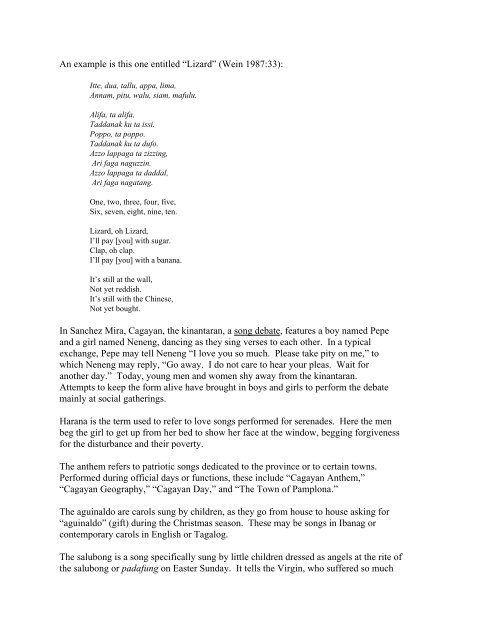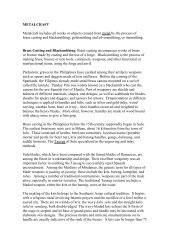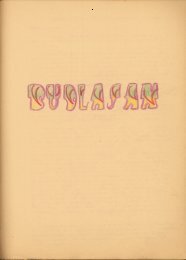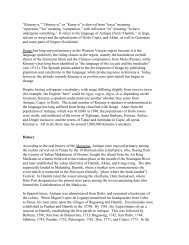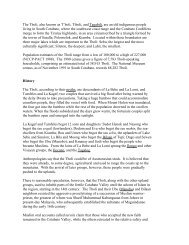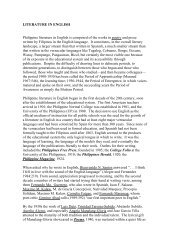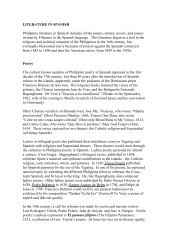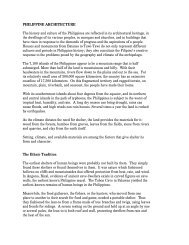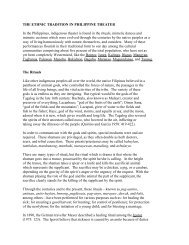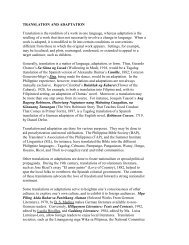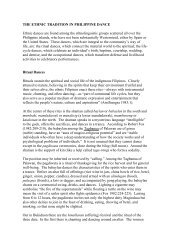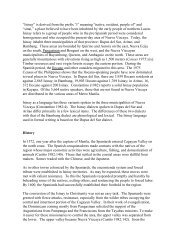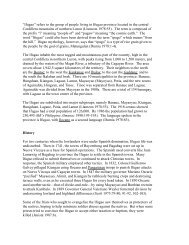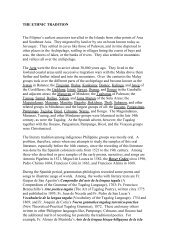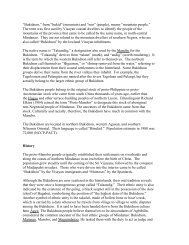The word “Ibanag” derives from the prefix “i” meaning ... - Buffalo
The word “Ibanag” derives from the prefix “i” meaning ... - Buffalo
The word “Ibanag” derives from the prefix “i” meaning ... - Buffalo
Create successful ePaper yourself
Turn your PDF publications into a flip-book with our unique Google optimized e-Paper software.
An example is this one entitled “Lizard” (Wein 1987:33):<br />
Itte, dua, tallu, appa, lima,<br />
Annam, pitu, walu, siam, mafulu.<br />
Alifa, ta alifa,<br />
Taddanak ku ta issi.<br />
Poppo, ta poppo.<br />
Taddanak ku ta dufo.<br />
Azzo lappaga ta zizzing,<br />
Ari faga naguzzin.<br />
Azzo lappaga ta daddal,<br />
Ari faga nagatang.<br />
One, two, three, four, five,<br />
Six, seven, eight, nine, ten.<br />
Lizard, oh Lizard,<br />
I’ll pay [you] with sugar.<br />
Clap, oh clap.<br />
I’ll pay [you] with a banana.<br />
It’s still at <strong>the</strong> wall,<br />
Not yet reddish.<br />
It’s still with <strong>the</strong> Chinese,<br />
Not yet bought.<br />
In Sanchez Mira, Cagayan, <strong>the</strong> kinantaran, a song debate, features a boy named Pepe<br />
and a girl named Neneng, dancing as <strong>the</strong>y sing verses to each o<strong>the</strong>r. In a typical<br />
exchange, Pepe may tell Neneng “I love you so much. Please take pity on me,” to<br />
which Neneng may reply, “Go away. I do not care to hear your pleas. Wait for<br />
ano<strong>the</strong>r day.” Today, young men and women shy away <strong>from</strong> <strong>the</strong> kinantaran.<br />
Attempts to keep <strong>the</strong> form alive have brought in boys and girls to perform <strong>the</strong> debate<br />
mainly at social ga<strong>the</strong>rings.<br />
Harana is <strong>the</strong> term used to refer to love songs performed for serenades. Here <strong>the</strong> men<br />
beg <strong>the</strong> girl to get up <strong>from</strong> her bed to show her face at <strong>the</strong> window, begging forgiveness<br />
for <strong>the</strong> disturbance and <strong>the</strong>ir poverty.<br />
<strong>The</strong> an<strong>the</strong>m refers to patriotic songs dedicated to <strong>the</strong> province or to certain towns.<br />
Performed during official days or functions, <strong>the</strong>se include “Cagayan An<strong>the</strong>m,”<br />
“Cagayan Geography,” “Cagayan Day,” and “<strong>The</strong> Town of Pamplona.”<br />
<strong>The</strong> aguinaldo are carols sung by children, as <strong>the</strong>y go <strong>from</strong> house to house asking for<br />
“aguinaldo” (gift) during <strong>the</strong> Christmas season. <strong>The</strong>se may be songs in Ibanag or<br />
contemporary carols in English or Tagalog.<br />
<strong>The</strong> salubong is a song specifically sung by little children dressed as angels at <strong>the</strong> rite of<br />
<strong>the</strong> salubong or padafung on Easter Sunday. It tells <strong>the</strong> Virgin, who suffered so much


